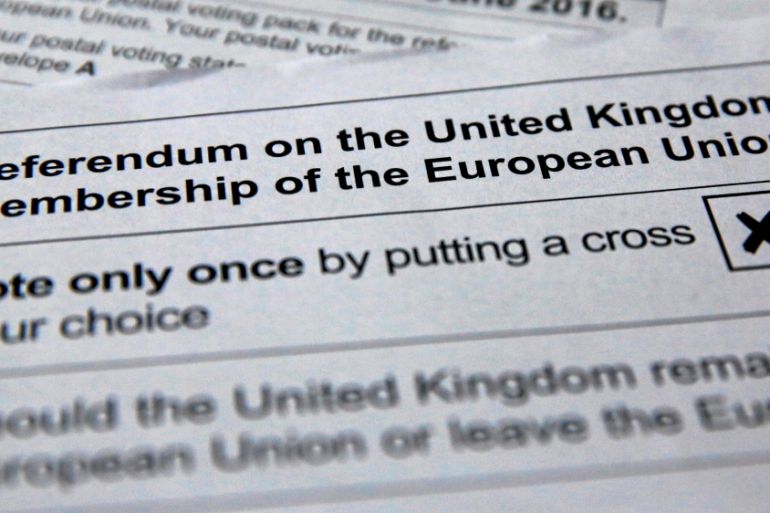UK: George Osborne warns of tax hikes in case of Brexit
Spending cuts will also follow if Britain votes to leave the European Union, says George Osborne, as referendum nears.

A vote to leave the European Union in a referendum next week would trigger tax hikes and spending cuts, Britain’s finance minister warned, as stock markets sank on the increasingly likely prospect of Brexit.
George Osborne, who is campaigning to remain within the 28-member bloc, announced on Wednesday that schools, hospitals and the army would all have their funding slashed if the pro-Brexit side prevails.
Keep reading
list of 4 itemsWhy are British farmers pleading for a universal basic income?
Northern Ireland agreement could end deadlock, restore government
Forced to become British: How Brexit created a new European diaspora
The intervention comes as polls indicate an surge in support for the “Leave” side days before the June 23 vote.
“Quitting the EU would hit investment, hurt families and harm the British economy,” he said in released remarks.
“I would have a responsibility to try to restore stability to the public finances and that would mean an emergency budget where we would have to increase taxes and cut spending.”
OPINION: Brexit and the UK’s geopolitical destiny
Osborne warned that leaving the EU would create a £30bn ($42.4bn) hole in national finances.
In response, the basic rate of income tax would be raised, inheritance tax would be increased, and the budget for services including the National Health Service would be cut, he said.
Osborne, a member of the ruling Conservative party of Prime Minister David Cameron, was backed up in his announcement by Alistair Darling, a former finance minister from the rival Labour party who managed Britain’s finances during the global economic crisis.
“I am even more worried now than I was in 2008,” Darling said in released remarks.
Jittery markets
Investors have responded to the pro-Brexit momentum by selling stocks and putting their money in safe havens, with Europe’s main markets down sharply and the euro hitting a 3.5-year low.
For the first time, demand for German government bonds viewed as rock-solid investments on Tuesday pushed their yields into negative territory.
As the campaign enters its final stretch, a poll by ComRes showed the race on a knife edge, with support for remaining at 46 percent and the pro-Brexit side on 45 percent.
This contrasts with a result from the same pollster just one month earlier in which the pro-remain side had an 11 point lead.
The day before Osborne’s remarks, rivals from the remain and leave camps clashed in a debate live-streamed on YouTube.
|
|
“The whole European project is a machine for generating excessive bureaucracy and red tape,” said Boris Johnson, a Conservative former London mayor and leading pro-Brexit campaigner.
“It is an economic disaster area.”
Alex Salmond, the former Scottish National Party leader who is campaigning to remain, countered that the EU brought social and worker protections and allowed Britain access a trade market of 500 million people.
The bloc had brought “peace and stability” to Europe, he said.
But after the debate, Osborne’s warning was dismissed by a pro-Leave Labour politician, John Mann.
“This is more scare tactics from the Remain side,” Mann said.
“If we vote to leave and take control of our money we will have more to spend on the priorities that matter to us like the NHS.”